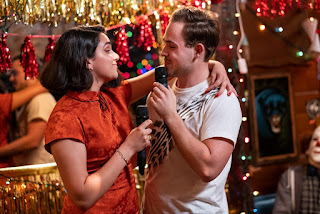The 1969 Trial of the Chicago 7 was an early piece of real-life political theater, a warped legal proceeding staged against a backdrop of roiling protest against the Vietnam War.
In The Trial of the Chicago 7, writer/director Aaron Sorkin mixes the account of an absurd courtroom drama with a slightly dimmed appreciation of the American spirit as embodied in the "radical" defendants and their rebellious lawyer.
In addition to the seven white defendants, Bobby Seale, a member of the Black Panthers, was attached to the proceedings as a kind of sidecar on the countercultural rollercoaster.
And rollercoaster it was: Sorkin zips his way through scene-after-scene as he dramatizes portions of a trial that lasted five months. Flashbacks enable him to abandon the confines of the courtroom. The organizers seek permits for the demonstrations. The police fire tear gas. A female FBI agent tries to cozy up to Jerry Rubin.
The period was chaotic and so, at times, is the movie, a series of sketches that bump up against one another, sometimes without great finesse. And for all its tumult, the movie offers little by way of game-changing overviews either of the period or of trial.
Limitations aside, the greatest allure of Sorkin's entertaining effort involves the work of a strong cast, an ensemble of gifted actors who walk us down the movie's countercultural memory lane.
Standouts include Sacha Baron Cohen as Abbie Hoffman and Eddie Redmayne as Tom Hayden, a founder of Students for a Democratic Society. Hoffman and Hayden shared common goals but disagreed on how to attain their goals.
Hoffman, who was very funny, relished theatrics; Hayden approached protest with high-stakes seriousness. Their disagreements and ultimate rapprochement underlies Sorkin's recreation of the trial.
The defendants weren't the only stars of the proceedings. A fine Mark Rylance portrays William Kunstler, the radical attorney who defended the seven.
Yahya Abdul-Mateen II makes a formidable Seal, the Black Panther who, along with the others, was charged with conspiracy to cross state lines to incite a riot. But unlike his co-defendants, Seal wasn't involved in planning the event and had been in Chicago for only two days during the 1o68 convention.
The so-called riot that's at the heart of the case took place in Chicago's Grant Park during the Democratic convention at which Hubert Humphrey was nominated to run against Richard Nixon.
In an introduction to the movie, Sorkin uses real footage in which the esteemed Walter Cronkite sets the stage: "The Democratic convention is about to begin in a police state. There just doesn't seem to be any other way to say it."
The defendants ran a gamut of personalities, but the size of the cast forces Sorkin into sketching rather than painting detailed portraits. David Dellinger (John Carroll Lynch) serves as a conventional guy with deep political convictions and Jeremy Strong portrays Jerry Rubin, who plays a kind of goofy second fiddle to Hoffman.
And, yes, Cohen gets pretty close to capturing Hoffman's Massachusetts accent and comedic instincts.
Hoffman and Rubin were Yippies; i.e., members of the Youth International Party, a group that flew a sex, drugs and rock 'n' roll banner over its protests.
Every trial needs a judge and this one had a particularly incapable one. Frank Langella's Julius Hoffman makes ridiculous decisions without ever really sensing the absurdity that threatens to overwhelm him.
Perhaps Hoffman's greatest faux pas occurred when he had the disruptive Seal, who eventually asked to defend himself, bound and gagged in the courtroom. The judge made Seal an advertisement for the oppressive nature of the trial. Charges against Seal were dropped before the trial finished.
Joseph Gordon Levitt plays the prosecutor, a decent enough fellow who, nonetheless, approaches his job seriously. John Mitchell (John Doman) -- Nixon's Attorney General -- personally assigned Gordon-Levitt's character to the trial for reasons that had more to do with what he thought the seven represented than with anything they did.
Michael Keaton does effective cameo duty as Ramsey Clark, the attorney general under Lyndon Johnson, who became a witness for the defense in the trial.
It may be difficult for those who weren't alive during the '60s to grasp just how incendiary the times were. The trial may have had a disembodied theatrical quality, but Americans and Vietnamese people were dying in a senseless war that awoke a generation of protest.
When the chips are down, Sorkin turns earnest and I wondered how another director might have lit the match that needed to be thrown onto this political gas can of a movie.
Still, the performances and byplay (a Sorkin specialty) give the movie plenty of burn.








 l
l






